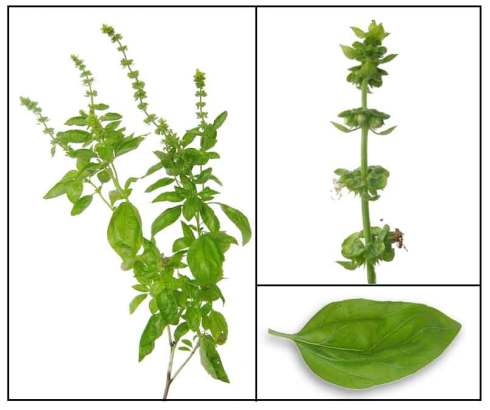You are currently browsing the category archive for the ‘Hiccups’ category.

Chemical constituents and properties
• The dried leaves contain 0.21–1% essential oil, the major compounds of which are linalool and methyclaviol.
• Some of the other compounds are: caffeic acid, p-coumaric acid, p-cymene, limonene, 1,8-cineole, methyl cinnamate, myrcene, quercetin, rutin, tryptophan, safrole.
• Study yielded 14 different anthocyanins: 11 cyanidin-based pigments and 3 peonidin-based pigments.
• Carminative, stimulant, diaphoretic, expectorant, febrifuge, diuretic, demulcent, mucilaginous, cooling.
Parts utilized
Leaves, seeds.
Mature fresh leaves are harvested 2 to 3 months after planting. Leaves are picked leaving the branches on the plant to allow it to flower and produce seeds for the next season.
The leaves are air-dried until they crumble when crushed with the fingers. Store in amber colored bottles in a cool, dry place.
Uses
Culinary
The leafy and flowering tops are used as condiment; eaten sparingly in salads.
Folkloric
Cough: Expectorant properties – Take infusion or decoction of herb (9-15 gm of dried herb) or tops as tea.
Leaf juice helpful for expectoration of mucus.
Decoction of leaves also used for hiccups, vomiting and nausea.
Gas pains: Decoction of herb as tea helps to expel wind from bowels.
Snake bites: Crush fresh plant and poultice the bitten wound.
Gonorrhea, using a decoction of the roots and leaves of plants.
Decoction of leaves used as a wash for ulcers.
External contusions.
Used in baths for rheumatic pains.
Ringworm and insect bites: Apply juice of crushed leaves.
Skin ulcers: Decoction of herb as wash.
For delayed menstruation: take the juice of the leaves with water.
Seeds are used in treatment of several eye diseases.
Toothache: Wet small piece of cotton with juice of crushed leaves and insert into tooth cavity.
Postpartum: Decoction of seeds used to decrease postpartum pains; the seeds are mucilaginous.
Poultice of seeds used for buccal sores.
Decoction of seeds also used for constipation.
Acne: Infusion of 3 tsp of dried leaves in 1 cup of boiling water for 20-30 minutes. Apply externally or drink decoction of tea or infusion 3 times daily.
Others
• Oils repel insects (limonene, myrcene, camphor, thymol) and have larvicidal (eugenol and methylclaviol) activity against houseflies and mosquitoes.
Recent uses
Dizziness: crush enough fresh leaves with your fingers and sniff them.
Cough: As decoction boil eight tablespoons of fresh leaves in two glasses of water for 15 minutes or until the liquid is reduced to half. Divide the decoction into eight parts and take one part, three times a day.
Studies
• Aqueous extracts of Ocimum basilicum L. (sweet basil) decrease platelet aggregation induced by ADP and thrombin in vitro and rats arterio–venous shunt thrombosis in vivo: Results showed Ocimum basilicum to possess an inhibitory effect on platelet aggregation induced by ADP and thrombin resulting in an anti-thrombotic effect in vivo.
• Cardiac stimulant activity of Ocimum basilicum Linn. extracts: The study evaluated the cardiac effects of extracts derived from the aerial parts of Ocimum basilicum. Results showed the alcoholic extracts exhibited a cardiotonic effect and the aqueous extract produced a B-adrenergic effect.
• Antimicrobial Effects of Ocimum basilicum (Labiatae) Extract: Results suggest that O. basilicum extracts possess compounds with antimicrobial properties against C. albicans and some bacterial pathogens.
• Anti-dyspepsia: A Double-Blind Placebo-Controlled study showed Ocimum basilicum seems to relieve functional dyspepsia in female and young patients with dysmotility.
• Anthocyanins in Basil : Purple basils are an abundant source of acylated and glycosylated anthocyanins, a potential source of stable red pigments to the food industry.
• Antioxidant: In a study of plants in the Lamiaceae family, the leaves and stems of Ocimum basilicum displayed the highest antioxidant activity.
• Antiulcer: Study showed the seed extracts of OB to possess significant anti-ulcer activity against ethanol-induced ulceration in animal models.
• Wound-Healing Activity: Wounds treated with honey in combination with OB alcoholic leaf extract and solcoseryl-jelly showed accelerated wound healing compared to honey alone.
• Antiproliferative / Anticancer: A study on the antiproliferative activity of essential oil from 17 thai medicinal plants on human mouth epidermal carcioma (KB) and murine leukemia (P388) cell lines. In the KB cell line, Sweet Basil (Ocimum basilicum) oil showed the highest anti-proliferative activity in the P388 cell line. The results suggested the potential of Thai medicinal plants for cancer treatment.
Toxicity
Although known for its medicinal benefits, it contains some potentially dangerous compounds: safrole, rutin, caffeic acid, tryptophan and quercetin.(See: Medicinal Plants for Livestock / Cornell University)
